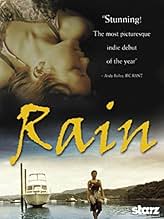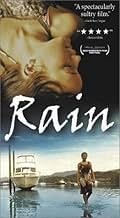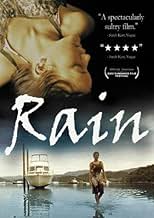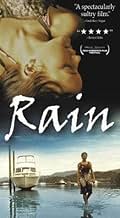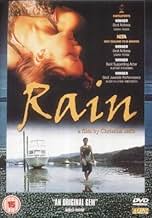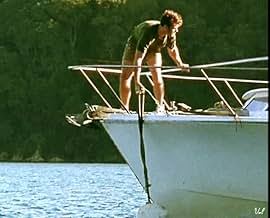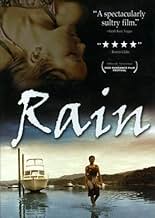IMDb RATING
6.8/10
1.7K
YOUR RATING
Whilst on a family vacation on the Mahurangi Peninsula in New Zealand, 13-year-old Janey begins to realize that her parents' marriage is on the rocks.Whilst on a family vacation on the Mahurangi Peninsula in New Zealand, 13-year-old Janey begins to realize that her parents' marriage is on the rocks.Whilst on a family vacation on the Mahurangi Peninsula in New Zealand, 13-year-old Janey begins to realize that her parents' marriage is on the rocks.
- Director
- Writers
- Stars
- Awards
- 5 wins & 6 nominations total
- Director
- Writers
- All cast & crew
- Production, box office & more at IMDbPro
Featured reviews
This film was delicious to watch. Some of the cinematography was really striking, as were some of the cinematographic choices, such as the sparing use of very brief black-and-white shots. I also liked the depictions of children at play (one moment in particular: when Jim cavorts in the dimly lit front yard at dusk in semi-slow-mo in a dracula cape, in a sort of scene-change-sideshow-distraction, innocently echoing the ominous tone of the previous scene). The play really rang true, reminding me of my own interactions with my siblings. The relationship between the two children was endearing and a welcome relief from the other very draining relationships in the movie.
I spent most of the film wondering whether a particular event was going to happen, and I felt that the few moments after it did happen near the end were the best of the film, UP UNTIL something else happened that I felt was a little over the top. The former event brought together the relationships that Janey, the young protagonist, had with all of the other characters in such rich, complex, achingly painful ways, it really left me in awe. It was a very strange experience, then, to have the second, over the top event happen not a minute later. I really felt this last event was unnecessary, and it cut me off from fully appreciating the best moment of the film.
So, the first 94 minutes or so were really great, and the last three, while they did cut me off from my greatest moment of admiration, did not detract from the overall greatness of the film.
I spent most of the film wondering whether a particular event was going to happen, and I felt that the few moments after it did happen near the end were the best of the film, UP UNTIL something else happened that I felt was a little over the top. The former event brought together the relationships that Janey, the young protagonist, had with all of the other characters in such rich, complex, achingly painful ways, it really left me in awe. It was a very strange experience, then, to have the second, over the top event happen not a minute later. I really felt this last event was unnecessary, and it cut me off from fully appreciating the best moment of the film.
So, the first 94 minutes or so were really great, and the last three, while they did cut me off from my greatest moment of admiration, did not detract from the overall greatness of the film.
Visually and acting wise masterly, the coming-of-age-story of a teenage girl unfolds an atmospheric undertow which solidifies through the parenthetical film music and the non-involved voice from the off of the young protagonist. It's shot mainly in sepia which in its dim alignment contributes to the mysterious beauty of the film. Convincing ensemble: Sarah Peirse personifies Kate with a restless and lascivious sensuality. The performances of Alistair Browning and Marton Csokas require a much more subtlety than their "Lord of the Rings" parts. But the true heart of the film are the wonderful performances of the young artists: the 15 years old Alicia Fulford-Wierzbicki who got the New Zealand Film Award as Best Young Talent, and the honestly adorable Aaron Murphy, playing the young, cute brother Jim. "Cinema of Unease", beautiful and uncomfortable at the same time, dangerously calm with subtly accentuated shots of a dusky landscape, the story tells the chronicle of an announced death.
"Rain" adds a striking share to a trilogy of recent films with "Fat Girl (a ma soeur)" and "Girls Can't Swim (Les filles ne savent pas nager)" about young teen girls on vacation Down the Shore with neglectful parents and annoying and sometimes adorable siblings, with each taking a different approach to their sexual exploration.
Based on a novella by Kirsty Gunn, New Zealander writer/director Christine Jeffs makes a powerful debut, capturing what the world of dysfunctional marriage, alcoholism, depression and adultery looks like to a girl trying to figure out how to model her behavior.
Maybe it's that antipodean take on larrikins, but Jeffs more than the other women filmmakers visually shows just how powerful a draw a sexy man is to a rebellious girl and her frustrated mother -- and maybe how unfortunately irresistible they are to him too ("Like mother, like daughter," he knowingly says.).
The patronizing guy in back of me completely disagreed with my interpretation focusing on the girl, instead going on that the movie was really about man's spiritual (and other) impotence causing depression or some such.
The beautiful music was by Neil Finn, with an excellent range of moody pop songs mostly by him, and others such as Lisa Germano, that communicated the girl's thoughts, though I can't tell if they are original to the movie.
I read the book to see if what I think was left a bit unresolved in the movie was in the book as well. The movie well captures the languorous poetry of the book and follows the basic plot, but emphasizes more the competition of the girl vs. the mother differently and the girl's growing pains, while the book stresses the sibling relationship, quite beautifully.
(originally written 5/11/2002)
Based on a novella by Kirsty Gunn, New Zealander writer/director Christine Jeffs makes a powerful debut, capturing what the world of dysfunctional marriage, alcoholism, depression and adultery looks like to a girl trying to figure out how to model her behavior.
Maybe it's that antipodean take on larrikins, but Jeffs more than the other women filmmakers visually shows just how powerful a draw a sexy man is to a rebellious girl and her frustrated mother -- and maybe how unfortunately irresistible they are to him too ("Like mother, like daughter," he knowingly says.).
The patronizing guy in back of me completely disagreed with my interpretation focusing on the girl, instead going on that the movie was really about man's spiritual (and other) impotence causing depression or some such.
The beautiful music was by Neil Finn, with an excellent range of moody pop songs mostly by him, and others such as Lisa Germano, that communicated the girl's thoughts, though I can't tell if they are original to the movie.
I read the book to see if what I think was left a bit unresolved in the movie was in the book as well. The movie well captures the languorous poetry of the book and follows the basic plot, but emphasizes more the competition of the girl vs. the mother differently and the girl's growing pains, while the book stresses the sibling relationship, quite beautifully.
(originally written 5/11/2002)
RAIN is set in New Zealand in the 1970's, but it could be anywhere, anytime. It's a sad tale about a family in the final stage of disintegration. The parents, teenage daughter and young son communicate only in occasional short bursts, so we learn about them from their gestures, actions and facial expressions.
Their summer holiday in a beach-front bach (holiday home) is a paradise gone sour, with the adults drowning their frustrations and disappointments in booze. Even the partying and midnight skinny-dipping isn't much fun seen through this movie's jaundiced lens. Casual, thoughtless flirtations finally lead to tragedy and the innocent suffer most.
The deceptively simple but intriguing story is open to various interpretations, and if you like small scale movies with an original take on life you should enjoy this movie. But don't expect a series of dramatic events, it's a quiet and slow-paced movie with convincing acting reinforced by a low-key sound-track.
Their summer holiday in a beach-front bach (holiday home) is a paradise gone sour, with the adults drowning their frustrations and disappointments in booze. Even the partying and midnight skinny-dipping isn't much fun seen through this movie's jaundiced lens. Casual, thoughtless flirtations finally lead to tragedy and the innocent suffer most.
The deceptively simple but intriguing story is open to various interpretations, and if you like small scale movies with an original take on life you should enjoy this movie. But don't expect a series of dramatic events, it's a quiet and slow-paced movie with convincing acting reinforced by a low-key sound-track.
A family of four vacations at their beach house in 1970's New Zealand. The parents are Kate (played by Sarah Peirse) and Ed (Alistair Browning), while the children are Janey (Alicia Fulford-Wierzbicki, about 13 years old) and Jim (Aaron Murphy, about 8). This sounds rather idyllic, but it is almost immediately obvious that Kate and Ed's marriage is on shaky ground. While the children get along better than most siblings and the parents do seem to care for their children, the adults in the film all drink large quantities of alcohol to numb themselves. The one other significant character is a photographer named Cady (Marton Csokas) who lives on his boat and reminded me a bit of fellow New Zealand actor Russell Crowe. I won't give away much of the plot, because there isn't much there to give away. This is not a criticism -- if anything, it is a compliment to the writers for avoiding unnecessary complications.
The main character is Janey, who is in transition from girl to woman. The young first time actress is extremely good and quite believable with this complex material. The boy who plays her brother is also very natural. The adults didn't impress me as much, but then again they were supposed to appear emotionally shut down, and they succeeded admirably. That much of the film's feeling is conveyed without words is a tribute to both the actors and to the direction (by first time director Christine Jeffs). The cinematography didn't seem to me to draw attention to itself, except one shot looking backwards through a hand pushed lawn mower.
The New Zealand accents were a bit difficult to understand at times. Without subtitles or the ability to back up and listen again, I did miss a few lines. Home video will likely make this aspect easier, but since much of the film is set outdoors, some of the atmosphere would be lost on the small screen.
I am surprised that none of the reviews I have seen compared this film to "The Ice Storm." Both films are set in the 1970's with parents who are emotionally distant and children (child in this case) who are becoming adults. While Ang Lee's film is definitely better in my view, that there is a comparison at all speaks highly for this effort. "Rain" is worth seeing, though probably not going out of your way for.
Seen on 6/3/2002.
The main character is Janey, who is in transition from girl to woman. The young first time actress is extremely good and quite believable with this complex material. The boy who plays her brother is also very natural. The adults didn't impress me as much, but then again they were supposed to appear emotionally shut down, and they succeeded admirably. That much of the film's feeling is conveyed without words is a tribute to both the actors and to the direction (by first time director Christine Jeffs). The cinematography didn't seem to me to draw attention to itself, except one shot looking backwards through a hand pushed lawn mower.
The New Zealand accents were a bit difficult to understand at times. Without subtitles or the ability to back up and listen again, I did miss a few lines. Home video will likely make this aspect easier, but since much of the film is set outdoors, some of the atmosphere would be lost on the small screen.
I am surprised that none of the reviews I have seen compared this film to "The Ice Storm." Both films are set in the 1970's with parents who are emotionally distant and children (child in this case) who are becoming adults. While Ang Lee's film is definitely better in my view, that there is a comparison at all speaks highly for this effort. "Rain" is worth seeing, though probably not going out of your way for.
Seen on 6/3/2002.
Did you know
- TriviaOf the picture's source 'Rain' (1994) novel, the film's director Christine Jeffs said: ''I really loved the sense of atmosphere and foreboding in the novel and also the reflection on childhood...The sense of transience in that relationships come and go and that the moment is precious''. The challenge for Jeffs was to recreate those elements in the medium of film. She added: ''I spent a long time trying to persuade other people that there was a film in there. A story about the detail of everyday life, that was worth translating to the screen.''
- GoofsAlthough this film is set in the year 1972, the partygoers at Ed and Kate's party are dancing to the Sherbert song "Howzat", which was not released until 1976.
- ConnectionsFeatured in Rain: Promo Reel (2003)
- SoundtracksBath/You Don't Know
Written by Neil Finn (as N. Finn)
Mushroom Music (Australia & New Zealand)
Roundhead Music administered by Wixen Music Publishing (USA & Canada)
EMI Music Publishing UK (rest of the world)
- How long is Rain?Powered by Alexa
Details
- Release date
- Country of origin
- Official sites
- Language
- Also known as
- Дождь
- Filming locations
- Rodney District, Auckland Region, New Zealand(location: Mahurangi Peninsula)
- Production companies
- See more company credits at IMDbPro
Box office
- Gross US & Canada
- $455,164
- Opening weekend US & Canada
- $15,222
- Apr 28, 2002
- Gross worldwide
- $492,661
- Runtime
- 1h 32m(92 min)
- Color
- Sound mix
- Aspect ratio
- 1.66 : 1
Contribute to this page
Suggest an edit or add missing content







